2024人教版七年级下册期末复习 U1-U3 课件 (共34张PPT)
文档属性
| 名称 | 2024人教版七年级下册期末复习 U1-U3 课件 (共34张PPT) |

|
|
| 格式 | pptx | ||
| 文件大小 | 10.4MB | ||
| 资源类型 | 教案 | ||
| 版本资源 | 人教新目标(Go for it)版 | ||
| 科目 | 英语 | ||
| 更新时间 | 2024-06-08 23:13:11 | ||
图片预览

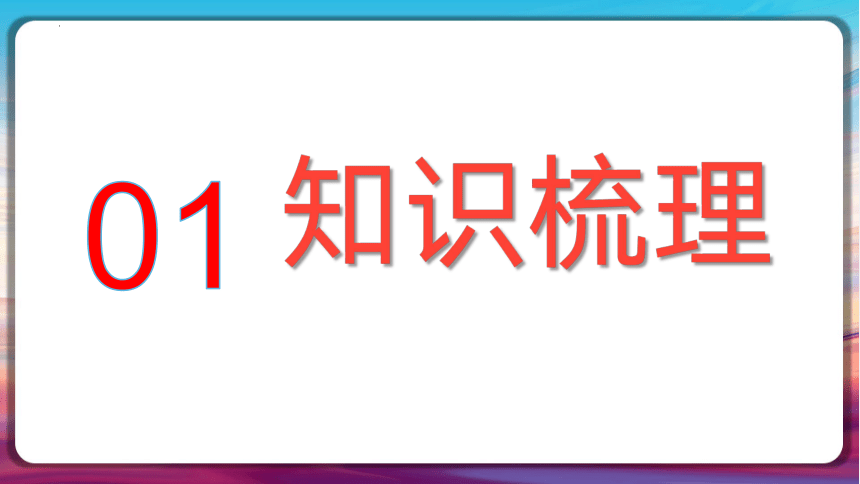
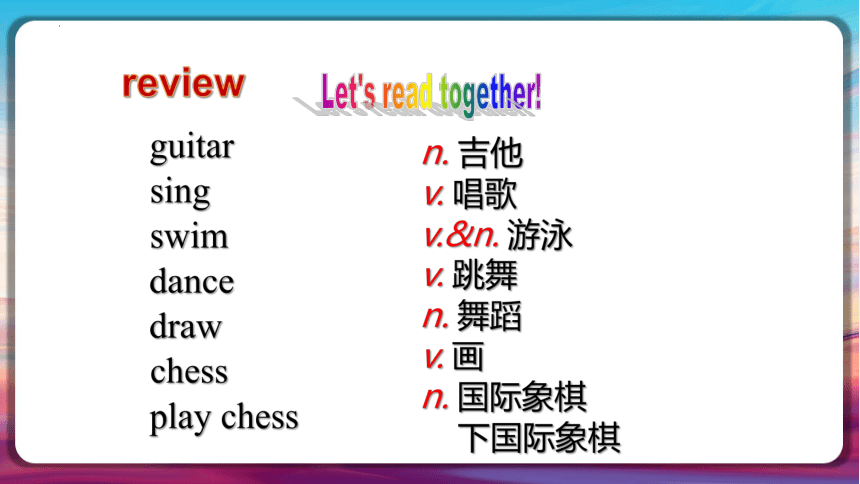
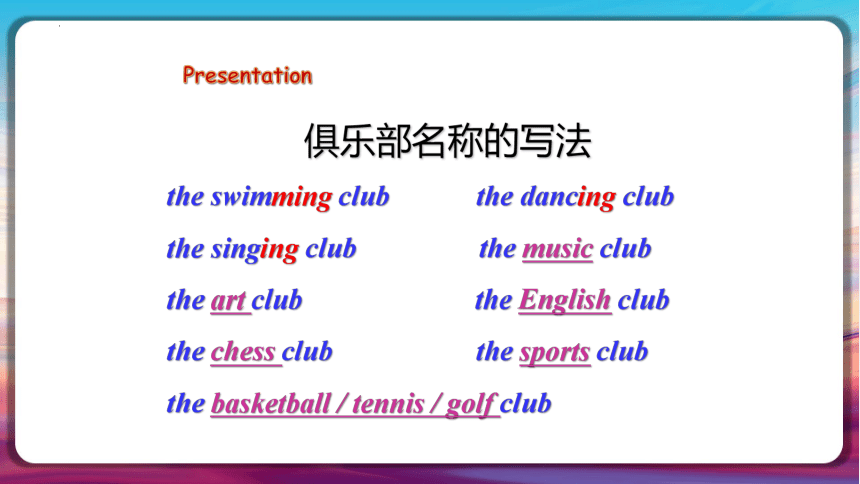

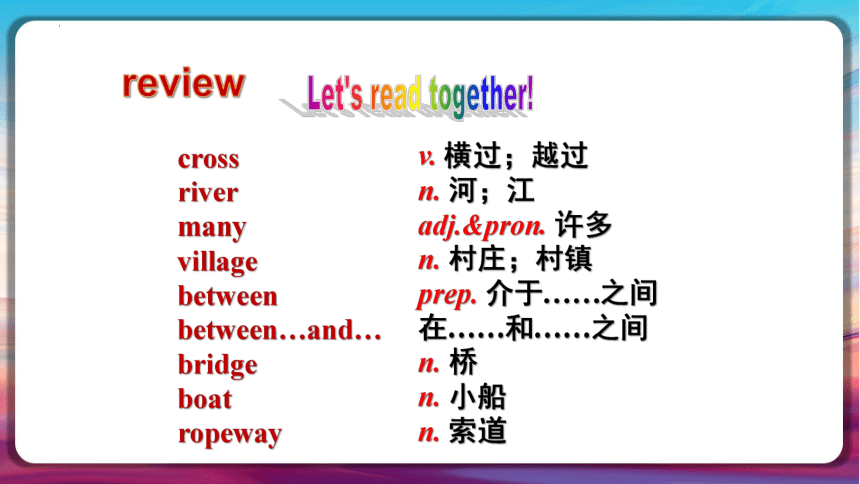
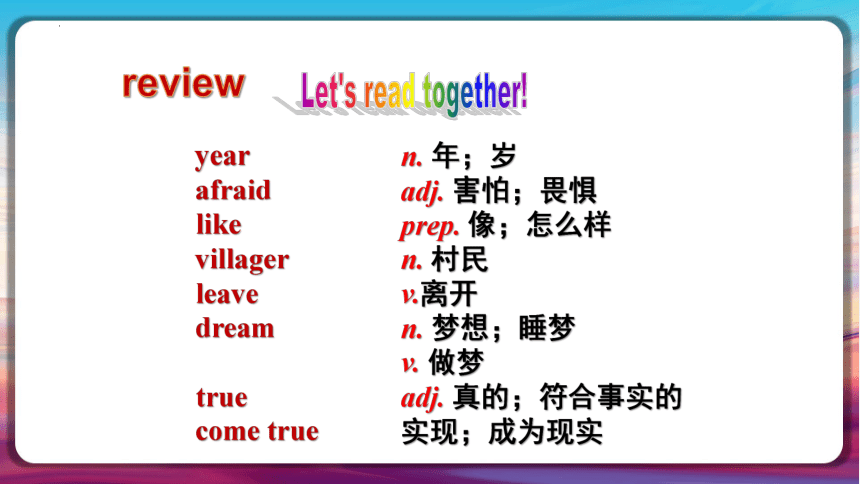
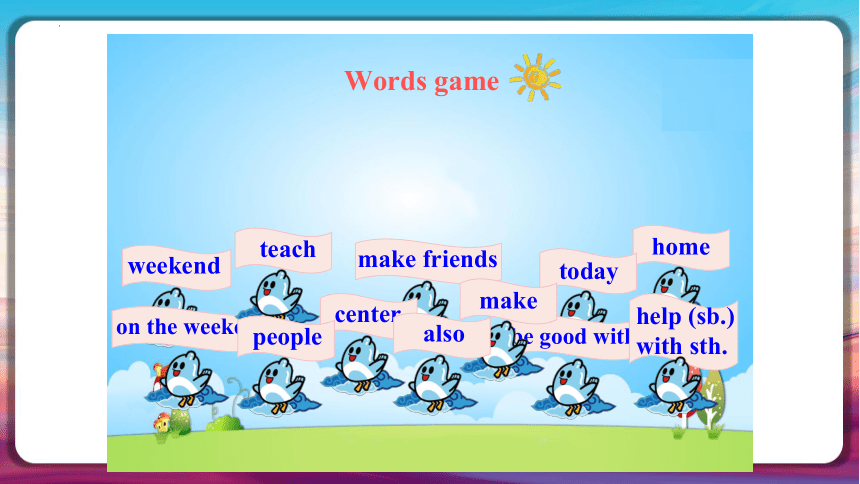
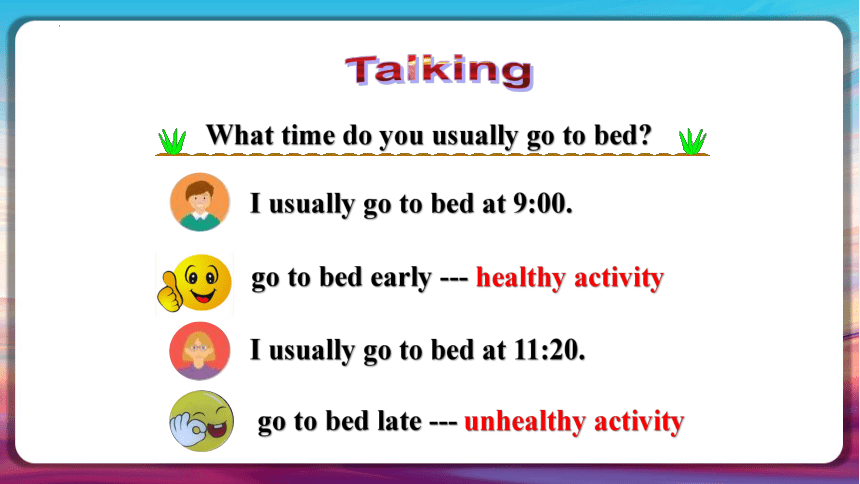
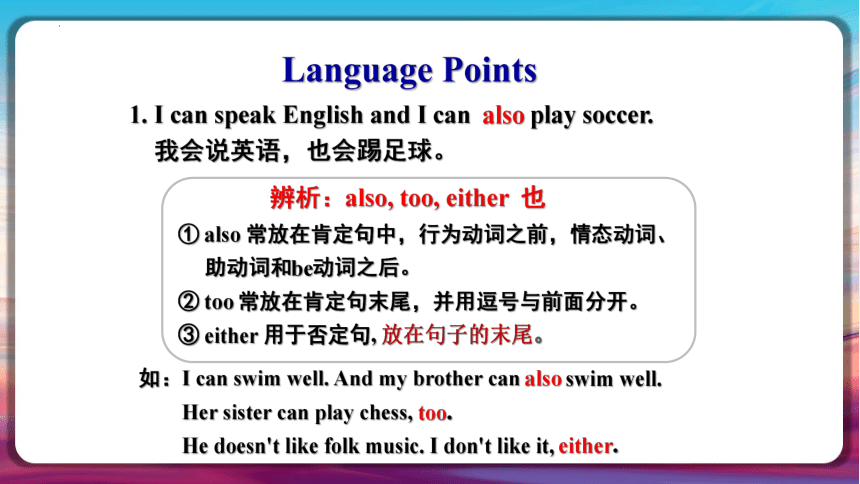
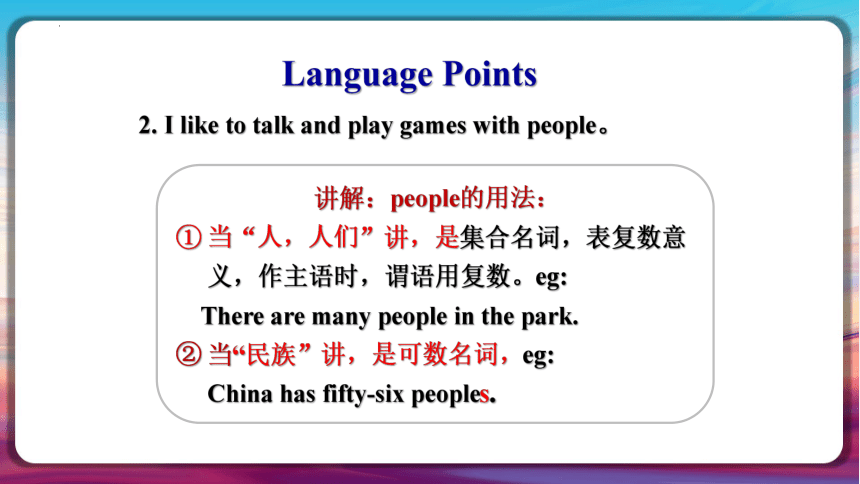
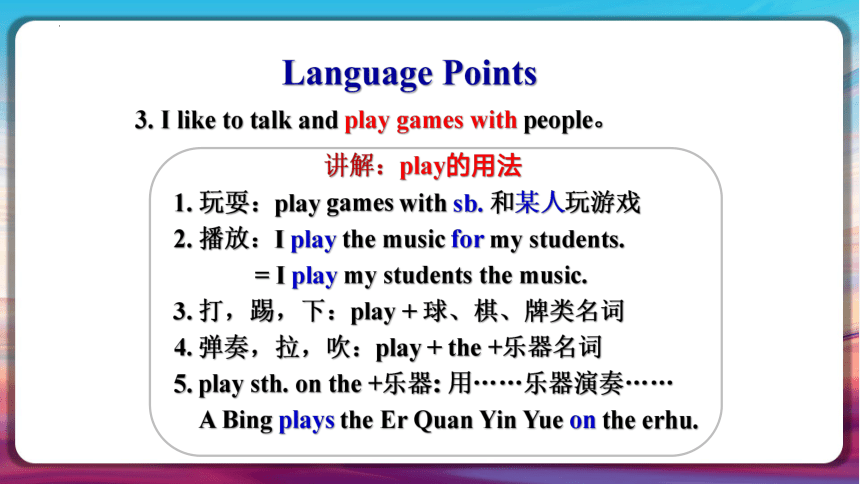
文档简介
(共34张PPT)
2024人教版
期末复习
u1-u3
知识梳理
01
guitar
sing
swim
dance
draw
chess
play chess
n. 吉他
v. 唱歌
v.&n. 游泳
v. 跳舞
n. 舞蹈
v. 画
n. 国际象棋
下国际象棋
Let's read together!
review
the swimming club the dancing club
the singing club the music club
the art club the English club
the chess club the sports club
the basketball / tennis / golf club
俱乐部名称的写法
Presentation
speak
speak English
join
club
be good at…
tell
story
v. 说(某种语言);说话
说英语
v. 参加;加入
n. 俱乐部;社团
擅长于……
v. 讲述;告诉
n. 故事;小说
Let's read together!
review
cross
river
many
village
between
between…and…
bridge
boat
ropeway
v. 横过;越过
n. 河;江
adj.&pron. 许多
n. 村庄;村镇
prep. 介于……之间
在……和……之间
n. 桥
n. 小船
n. 索道
Let's read together!
review
year
afraid
like
villager
leave
dream
true
come true
n. 年;岁
adj. 害怕;畏惧
prep. 像;怎么样
n. 村民
v.离开
n. 梦想;睡梦
v. 做梦
adj. 真的;符合事实的
实现;成为现实
Let's read together!
review
home
today
weekend
make friends
be good with
make
on the weekend
center
teach
also
help (sb.) with sth.
people
Words game
go to bed late --- unhealthy activity
What time do you usually go to bed
I usually go to bed at 9:00.
go to bed early --- healthy activity
I usually go to bed at 11:20.
Talking
1. I can speak English and I can also play soccer.
我会说英语,也会踢足球。
① also 常放在肯定句中,行为动词之前,情态动词、
助动词和be动词之后。
② too 常放在肯定句末尾,并用逗号与前面分开。
③ either 用于否定句, 放在句子的末尾。
辨析:also, too, either 也
如:I can swim well. And my brother can also swim well.
Her sister can play chess, too.
He doesn't like folk music. I don't like it, either.
Language Points
讲解:people的用法:
① 当“人,人们”讲,是集合名词,表复数意
义,作主语时,谓语用复数。eg:
There are many people in the park.
② 当“民族”讲,是可数名词,eg:
China has fifty-six peoples.
2. I like to talk and play games with people。
Language Points
讲解:play的用法
1. 玩耍:play games with sb. 和某人玩游戏
2. 播放:I play the music for my students.
= I play my students the music.
3. 打,踢,下:play + 球、棋、牌类名词
4. 弹奏,拉,吹:play + the +乐器名词
5. play sth. on the +乐器: 用……乐器演奏……
A Bing plays the Er Quan Yin Yue on the erhu.
3. I like to talk and play games with people。
Language Points
4. Are you good with old people
你善于与老人相处吗?
be good with sb.意为“善于和某人相处;和某人相处得好;对于……有办法”
Ms. Brown is good with students.
布朗女士擅于和学生们交往。
Jack is not good with people.
杰克不太擅于与人相处。
Language Points
辨 析:
① be good with ... “善于应付…;与…相处好”
② be good at... “擅长 ...”
Tom is good at math. So he often helps me.
③ be good to... “对……友好 ”
Although Miss Lee is serious, she is good to us.
④ be good for... “对…… 有益 ”
Swimming is good for our health.
5. Are you good with old people
Language Points
2. early late (adj. & adv.)
6. I don’t like to get up early.
1. up down (adv.)
get up 起床;站起来
sit down 坐下
I always take an early bus to school.
She usually gets up early in the morning.
Language points
Language notes
7. I don’t have much time for breakfast. So I usually eat very quickly.
1) time n. ① 时间 (不可数) ② 次数 (可数)
Language points
have (much) time
have no time
for sth. / to do sth.
2) quick adj. 修饰名词。
quickly adv. 修饰动词。
Be _______.
She usually eats breakfast _______ .
He has a ________ lunch in the office.
= He eats lunch __________ in the office.
quick
quickly
quick
quickly
Language notes
1)sometimes = at times adv. “有时;不时” ,通
常与一般现在时连用,位置灵活,可放在句首,
句末或句中。
Sometimes he gets up late.
He sometimes gets up late.
He gets up late sometimes.
sometimes 有时
some times 几次
sometime 某时
some time 一段时间
8. I sometimes play basketball for half an hour.
【区别】
Language points
Language notes
2)hour n. “小时” , 同音异义词:our
an hour
twelve hours
half an hour
for + 一段时间 for half an hour
Language points
Language notes
表达“几个半……”时,可用:
one+单数名词+ and a half,如“一个半小时”为:
one hour and a half,
数词+复数名词+ and a half,如“两个半小时”为:
two hours and a half。
9. When I get home, I always do my homework first.
1)home n. 家
adv. 在家; 回家; 到家
my home
a happy home
go/get/run home
bring/take … home
get to … 到达……
get to school get to Beijing
get home get here get there
n.
adv.
Language points
Language notes
Lanauage points
10. For many students, it is easy to get to school.
对于许多学生来说,上学很容易。
1) many adj.& pron. “许多”
英语中表示“多”的意思,可用many, much, a lot of, lots of 等。
many修饰可数名词复数,表许多。
much修饰不可数名词,表量或程度。
a lot of = lots of 既修饰可数名词复数,又修饰不可数名词。
2) It (形式主语) is + adj. (for sb.) to do sth. (真正主语)
“对某人来说干某事是……”, 例如:
It is interesting for me to play computer games.
对我来说玩电脑游戏很有趣。
It is very nice of you to help me study English.
Is it easy for them ______ (get) to school
It’s very important ___ us to make a plan before a new term.
A. of B. for C. to
B
to get
Lanauage points
11. There is a very big river between their school and the village. 在他们的学校和乡村之间有一条大河。
1)there be 强调存在的状态。在there be结构中,主
语应放在be动词之后,be动词应与主语保持一致。
There are many apples on the tree.
Lanauage points
【拓展】
have 强调“所属” 关系 ,表示“拥有,具有”。
在这一结构中,have与主语保持人称和数的一致。
She has a nice schoolbag.
2) between … and … 表示 “在……与 …之间”。
between 是个介词,表示在两者之间。
如:Mary is between Jane and Linda in the line.
He sits between Lucy and Lily.
Lanauage points
— Guess, how much does it cost
— I think it costs _____ 15 and 20 dollars.
A. from B. between C. among D. with
B
选择:
12. There is no bridge and the river runs too quickly for
boats. 河上根本没有桥,而且水流很急,不适宜小
船摆渡。
(1)此句是英语否定结构的一种。 no 用于构成否定句时,主要用于名词前,否定其后的名词,其意是“完全不、根本没有” 。如:
There is no fruit in the fridge. 冰箱里没有水果了。
There are no computers in that small mountain village.
在那个小山村里根本就没有电脑。
Lanauage points
(2) run 在这里表示“液体流动”。再如:
The river runs into the sea. 这条河流入大海。
Your nose is running, Jack. Do you have a cold
它在不同的语境中有不同的用法和含义:
Who runs the business 生意是谁经营的
“run”表示 “管理;经营”
② John run a car into a park. John把车开进了公园。
“run”表示 “使行驶;驾驶”
Lanauage points
模拟练习
02
Exercises
一、写出下列词组。
下国际象棋 _______________
2. 说英语 _______________
3. 想要做某事 _______________
4. 参加美术俱乐部 _______________
5. 英语俱乐部 _______________
play chess
speak English
want to do sth.
join the art club
English club
6. 音乐俱乐部 ______________
7. 国际象棋俱乐部 ______________
8. 游泳俱乐部 ______________
9. 踢足球 ______________
10. 听起来不错 ______________
music club
chess club
swimming club
play soccer
Sounds good.
Exercises
Exercises
二、用所给单词的适当形式填空。
1. Can you ______ (dance) dance, Jane
2. I want _______ (join) the music club.
3. Let’s _____ (join) the English club.
4. Alice can’t ______ (speak) Chinese well.
5. Well. You can join the __________ (swim) club.
6. Jane _____ (want) to join a sports club.
dance
to join
join
speak
swimming
wants
课堂练习
一、根据句意及首字母提示补全单词
The boy r his bike to work in the
morning.
2. Mary takes the t to school.
Do you go home by bus or by (出
租)?
4. - How does your father get to work
-He w there.
ides
rain
taxi
alks
二、按要求填空:
1. My home is near. I ______(步行) to school.
2. Li Lei ______ the subway (乘地铁) to school.
3. His father often goes to Shanghai ___ ______
(坐飞机).
4. If you don’t want to be late, you’d better
______ a _____(打的).
5. _______ ____ ____ (骑自行车) to work
is good for our health, I think.
walk
takes
by plane
take
taxi
Riding the bike
拓展提高
1. I often ____ to school.
A. by bikes B. by car
C. take a bus D. by a train
2. You can go to the park ___ bike.
A. ride B. by C. take a D. by a
3. — How do you usually come to school
— ___ car.
A. By B. In C. On D. At
4. Many students in our school come to school ___ .
A. by buses B. ride bikes
C. on their bikes D. take trains
C
B
A
C
一、选择填空
1. He ride the train to work on weekdays.
A B C
2. Sally’s father by a car to work.
A B C
3. They go to the farm by their bikes.
A B C
4. His friends went to Shanghai on plane.
A B C
5. Some of us go to school on feet.
A B C
takes
takes
takes/drives
on
by
foot
takes
二、单句改错
thanks
2024人教版
期末复习
u1-u3
知识梳理
01
guitar
sing
swim
dance
draw
chess
play chess
n. 吉他
v. 唱歌
v.&n. 游泳
v. 跳舞
n. 舞蹈
v. 画
n. 国际象棋
下国际象棋
Let's read together!
review
the swimming club the dancing club
the singing club the music club
the art club the English club
the chess club the sports club
the basketball / tennis / golf club
俱乐部名称的写法
Presentation
speak
speak English
join
club
be good at…
tell
story
v. 说(某种语言);说话
说英语
v. 参加;加入
n. 俱乐部;社团
擅长于……
v. 讲述;告诉
n. 故事;小说
Let's read together!
review
cross
river
many
village
between
between…and…
bridge
boat
ropeway
v. 横过;越过
n. 河;江
adj.&pron. 许多
n. 村庄;村镇
prep. 介于……之间
在……和……之间
n. 桥
n. 小船
n. 索道
Let's read together!
review
year
afraid
like
villager
leave
dream
true
come true
n. 年;岁
adj. 害怕;畏惧
prep. 像;怎么样
n. 村民
v.离开
n. 梦想;睡梦
v. 做梦
adj. 真的;符合事实的
实现;成为现实
Let's read together!
review
home
today
weekend
make friends
be good with
make
on the weekend
center
teach
also
help (sb.) with sth.
people
Words game
go to bed late --- unhealthy activity
What time do you usually go to bed
I usually go to bed at 9:00.
go to bed early --- healthy activity
I usually go to bed at 11:20.
Talking
1. I can speak English and I can also play soccer.
我会说英语,也会踢足球。
① also 常放在肯定句中,行为动词之前,情态动词、
助动词和be动词之后。
② too 常放在肯定句末尾,并用逗号与前面分开。
③ either 用于否定句, 放在句子的末尾。
辨析:also, too, either 也
如:I can swim well. And my brother can also swim well.
Her sister can play chess, too.
He doesn't like folk music. I don't like it, either.
Language Points
讲解:people的用法:
① 当“人,人们”讲,是集合名词,表复数意
义,作主语时,谓语用复数。eg:
There are many people in the park.
② 当“民族”讲,是可数名词,eg:
China has fifty-six peoples.
2. I like to talk and play games with people。
Language Points
讲解:play的用法
1. 玩耍:play games with sb. 和某人玩游戏
2. 播放:I play the music for my students.
= I play my students the music.
3. 打,踢,下:play + 球、棋、牌类名词
4. 弹奏,拉,吹:play + the +乐器名词
5. play sth. on the +乐器: 用……乐器演奏……
A Bing plays the Er Quan Yin Yue on the erhu.
3. I like to talk and play games with people。
Language Points
4. Are you good with old people
你善于与老人相处吗?
be good with sb.意为“善于和某人相处;和某人相处得好;对于……有办法”
Ms. Brown is good with students.
布朗女士擅于和学生们交往。
Jack is not good with people.
杰克不太擅于与人相处。
Language Points
辨 析:
① be good with ... “善于应付…;与…相处好”
② be good at... “擅长 ...”
Tom is good at math. So he often helps me.
③ be good to... “对……友好 ”
Although Miss Lee is serious, she is good to us.
④ be good for... “对…… 有益 ”
Swimming is good for our health.
5. Are you good with old people
Language Points
2. early late (adj. & adv.)
6. I don’t like to get up early.
1. up down (adv.)
get up 起床;站起来
sit down 坐下
I always take an early bus to school.
She usually gets up early in the morning.
Language points
Language notes
7. I don’t have much time for breakfast. So I usually eat very quickly.
1) time n. ① 时间 (不可数) ② 次数 (可数)
Language points
have (much) time
have no time
for sth. / to do sth.
2) quick adj. 修饰名词。
quickly adv. 修饰动词。
Be _______.
She usually eats breakfast _______ .
He has a ________ lunch in the office.
= He eats lunch __________ in the office.
quick
quickly
quick
quickly
Language notes
1)sometimes = at times adv. “有时;不时” ,通
常与一般现在时连用,位置灵活,可放在句首,
句末或句中。
Sometimes he gets up late.
He sometimes gets up late.
He gets up late sometimes.
sometimes 有时
some times 几次
sometime 某时
some time 一段时间
8. I sometimes play basketball for half an hour.
【区别】
Language points
Language notes
2)hour n. “小时” , 同音异义词:our
an hour
twelve hours
half an hour
for + 一段时间 for half an hour
Language points
Language notes
表达“几个半……”时,可用:
one+单数名词+ and a half,如“一个半小时”为:
one hour and a half,
数词+复数名词+ and a half,如“两个半小时”为:
two hours and a half。
9. When I get home, I always do my homework first.
1)home n. 家
adv. 在家; 回家; 到家
my home
a happy home
go/get/run home
bring/take … home
get to … 到达……
get to school get to Beijing
get home get here get there
n.
adv.
Language points
Language notes
Lanauage points
10. For many students, it is easy to get to school.
对于许多学生来说,上学很容易。
1) many adj.& pron. “许多”
英语中表示“多”的意思,可用many, much, a lot of, lots of 等。
many修饰可数名词复数,表许多。
much修饰不可数名词,表量或程度。
a lot of = lots of 既修饰可数名词复数,又修饰不可数名词。
2) It (形式主语) is + adj. (for sb.) to do sth. (真正主语)
“对某人来说干某事是……”, 例如:
It is interesting for me to play computer games.
对我来说玩电脑游戏很有趣。
It is very nice of you to help me study English.
Is it easy for them ______ (get) to school
It’s very important ___ us to make a plan before a new term.
A. of B. for C. to
B
to get
Lanauage points
11. There is a very big river between their school and the village. 在他们的学校和乡村之间有一条大河。
1)there be 强调存在的状态。在there be结构中,主
语应放在be动词之后,be动词应与主语保持一致。
There are many apples on the tree.
Lanauage points
【拓展】
have 强调“所属” 关系 ,表示“拥有,具有”。
在这一结构中,have与主语保持人称和数的一致。
She has a nice schoolbag.
2) between … and … 表示 “在……与 …之间”。
between 是个介词,表示在两者之间。
如:Mary is between Jane and Linda in the line.
He sits between Lucy and Lily.
Lanauage points
— Guess, how much does it cost
— I think it costs _____ 15 and 20 dollars.
A. from B. between C. among D. with
B
选择:
12. There is no bridge and the river runs too quickly for
boats. 河上根本没有桥,而且水流很急,不适宜小
船摆渡。
(1)此句是英语否定结构的一种。 no 用于构成否定句时,主要用于名词前,否定其后的名词,其意是“完全不、根本没有” 。如:
There is no fruit in the fridge. 冰箱里没有水果了。
There are no computers in that small mountain village.
在那个小山村里根本就没有电脑。
Lanauage points
(2) run 在这里表示“液体流动”。再如:
The river runs into the sea. 这条河流入大海。
Your nose is running, Jack. Do you have a cold
它在不同的语境中有不同的用法和含义:
Who runs the business 生意是谁经营的
“run”表示 “管理;经营”
② John run a car into a park. John把车开进了公园。
“run”表示 “使行驶;驾驶”
Lanauage points
模拟练习
02
Exercises
一、写出下列词组。
下国际象棋 _______________
2. 说英语 _______________
3. 想要做某事 _______________
4. 参加美术俱乐部 _______________
5. 英语俱乐部 _______________
play chess
speak English
want to do sth.
join the art club
English club
6. 音乐俱乐部 ______________
7. 国际象棋俱乐部 ______________
8. 游泳俱乐部 ______________
9. 踢足球 ______________
10. 听起来不错 ______________
music club
chess club
swimming club
play soccer
Sounds good.
Exercises
Exercises
二、用所给单词的适当形式填空。
1. Can you ______ (dance) dance, Jane
2. I want _______ (join) the music club.
3. Let’s _____ (join) the English club.
4. Alice can’t ______ (speak) Chinese well.
5. Well. You can join the __________ (swim) club.
6. Jane _____ (want) to join a sports club.
dance
to join
join
speak
swimming
wants
课堂练习
一、根据句意及首字母提示补全单词
The boy r his bike to work in the
morning.
2. Mary takes the t to school.
Do you go home by bus or by (出
租)?
4. - How does your father get to work
-He w there.
ides
rain
taxi
alks
二、按要求填空:
1. My home is near. I ______(步行) to school.
2. Li Lei ______ the subway (乘地铁) to school.
3. His father often goes to Shanghai ___ ______
(坐飞机).
4. If you don’t want to be late, you’d better
______ a _____(打的).
5. _______ ____ ____ (骑自行车) to work
is good for our health, I think.
walk
takes
by plane
take
taxi
Riding the bike
拓展提高
1. I often ____ to school.
A. by bikes B. by car
C. take a bus D. by a train
2. You can go to the park ___ bike.
A. ride B. by C. take a D. by a
3. — How do you usually come to school
— ___ car.
A. By B. In C. On D. At
4. Many students in our school come to school ___ .
A. by buses B. ride bikes
C. on their bikes D. take trains
C
B
A
C
一、选择填空
1. He ride the train to work on weekdays.
A B C
2. Sally’s father by a car to work.
A B C
3. They go to the farm by their bikes.
A B C
4. His friends went to Shanghai on plane.
A B C
5. Some of us go to school on feet.
A B C
takes
takes
takes/drives
on
by
foot
takes
二、单句改错
thanks
同课章节目录
